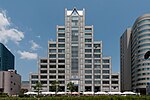Aoyama Gakuin University

Aoyama Gakuin University (Japanese: 青山学院大学, Hepburn: Aoyama Gakuin Daigaku, AGU) is a private Christian university in Shibuya, Tokyo, Japan. Originally established in 1874 by missionaries from the Methodist Episcopal Church, it was reconfigured in its current form in 1949 as part of Aoyama Gakuin. Aoyama Gakuin University had its 140th anniversary in 2014 and is one of Japan's oldest higher education facilities. The university's undergraduate and graduate programs include courses on literature, law, economics, business, international politics, economics, communication, science, engineering and cultural studies. The university graduate programs include international management, law and professional accounting. Aoyama Gakuin University has participated in Hakone Ekiden, an annual university relay race between Tokyo and Hakone in Japan. Recently they won the races in 2015, 2016, 2017, 2018, 2020, and 2022.
Excerpt from the Wikipedia article Aoyama Gakuin University (License: CC BY-SA 3.0, Authors, Images).Aoyama Gakuin University
八幡通り, Shibuya
Geographical coordinates (GPS) Address External links Nearby Places Show on map
Geographical coordinates (GPS)
| Latitude | Longitude |
|---|---|
| N 35.661111111111 ° | E 139.71055555556 ° |
Address
青山学院大学
八幡通り
150-8366 Shibuya
Japan
Open on Google Maps








